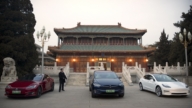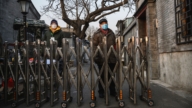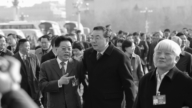【新唐人2012年6月16日讯】十八大前,大陆各省除了北京和重庆以外,其他29个省级的党委班子换届工作已经完成。今年已经换届的省份中,有16个省份的专职副书记另有兼职,并且大多为重要职务,其中以“政法委书记”为主要阵地。评论人士认为,这是胡温对血债派的一次大换血。
6月13号,新一届湖北省党委班子的选举已经结束,截至目前,大陆已经有29个省级党委班子完成换届。在新班子中,除了新疆、西藏等少数省区外,其他还是维持了省委班子“一正两副”的原有格局。不过,今年已经换届的省份中,有16个省份的专职副书记另有兼职,并且大多为重要职务。
香港《大公报》报导,在这次换届过程中,截至目前各省“政法委书记”是副书记兼职的主要阵地。广东的朱明国、黑龙江的杜家毫、青海的王建明、浙江的李强和内蒙古的李佳五人兼任政法委书记。其中,杜家毫和朱明国是最近兼任政法委书记。
另外,近期广东21地市在班底重组中,将以往公安局长兼任政法委书记的做法,改为“公安局长由副市长兼任”,多地“原政法委书记不再担任省委常委”,多地文职人员转任政法委书记。
“山东大学”教授孙文广:“我认为它现在可能上面有一种意向,来削弱原来政法委这个权力和重要地位。”
自从前重庆公安局长王立军出逃美领馆,到薄熙来的倒台,中共官员各种贪婪腐败丑闻,再一次暴露在民众的视野当中。过程中,更戏剧性的牵出“中共政法委涉及谋乱夺权”的惊天黑幕。这一事件的爆发,使中共体制内出现了前所未有的政治动荡,在国际上也引起了许多国家的关注和惊醒。
大陆民间维权律师李向阳:“因为政法委他们是统揽了公检法,他们扰乱了中国的法制秩序,已经臭名昭著。共产党已经丧失了民心,到下层的民众中去问一下,没有一个不去骂共产党的。”
时事评论员蓝述表示,中共面临着内焦外困的情况,为了继续求得生存,不得不作出这么一个举动。
蓝述:“因为这个政法系统,在过去江泽民执政时期它的名声最臭。可以说是通过政法系统去维稳,在整个维稳的过程中,对异议人士,民权团体,少数民族,整个的这个维稳机制,可以说是在中国的民众里面完完全全的声名狼藉,民声非常不好。”
蓝述分析,这属于中共内部的改革,只是在官场上看上去是减少了一些程序。
蓝述:“我觉得这里面它反映的信息可以说是两方面的。一个是中共进入2012年以后,可以说是风雨飘摇,它遇到了全面的执政危机,所以说它必须做一定的改变,应对中国社会重重的矛盾。”
但是,蓝述认为,中共所有的这些改革,由于它的本质没有改变,没有任何一个能够和社会接轨的价值观,所以中共是不可能有前途的。不过,他说,中共目前的这个改变,也不排除在中共体制里面,有像温家宝这一类要求改革的声音。
因此,蓝述强调,胡温要想改革,只有抛开中国现行这个政治体制,改革才有前途。
采访编辑/唐睿 后制/李若琳
Replacement of CCP Provincial Leadership Almost Complete, 16 Deputy Provincial Secretaries Have a Second Appointment
Besides Beijing and Chongqing, leaderships of the other 29
Chinese Communist Party’s (CCP) provincial governments have been replaced before the 18th National Congress.
Within these 29 provinces, 16 dedicated deputy secretaries
have been appointed to a second position, most of which are leader of Political and Judiciary Committee.
Commentators believe that this is a big shake up pertaining
to Hu-Wen’s replacement of the “Blood Debt Faction.”
On June 13, CCP Hubei Provincial leadership changed.
Up until now, 29 CCP provincial leaders have changed.
Out of the changed ones, except for Xinjiang and Tibet,
all the leaderships kept the former structure of one secretary and two deputy secretaries.
Within the new leaderships, 16 provincial dedicated
deputy secretaries had been named to a second position.
Most of them are key positions.
The Hong Kong “Ta Kung Pao” reported the leader of Political
and Judiciary Committee is the main second position for the deputy provincial secretary.
Zhu Mingguo from Guangdong province, Du Jiahao from
Heilongjiang province, Wang Jianming from Qinghai province,
Li Qiang from Zhejiang province and Li Jia from Inner Mongolia
province were named the secretary of Political and Judiciary Committee.
Among them, Du Jiahao and Zhu Mingguo
are new in this position.
In addition, the recent 21 CCP city leaders’ replacement
in Guangzhou Province has changed.
The police chief took the secretary of Political and Judiciary
Committee as second position, and the deputy mayor took police chief as second position.
The secretary of Political and Judiciary Committee
is taken by the non-military official, and will not be a member of the provincial standing committee.
Sun Wenguang, a professor from Shandong University:
“I think that it may be the intention of the higher leaders.
They want to weaken the power and position
of the Political and Judiciary Committee.”
Since Wang Lijun, the former Chongqing police chief, fled
to the U.S. Consulate, and then the downfall of Bo Xilai,
all kinds of greed and corrupt scandals of CCP officials
were exposed in the public.
Within the process, the most dramatic news was that,
the Political and Judiciary Committee planned to seize power.
This event initiated unprecedented political turmoil within
the CCP system, and also attracted the attention of many countries, awakening them.
Li Xiangyang, a Chinese human rights lawyer: ”The political
and Judiciary Committee controlled all public securities, prosecutions and courts.
They notoriously disrupt the legal order.
CCP has lost the people’s support.
If you ask any people from the lower class, nobody doesn’t
criticize the CCP.”
Lan Shu, a current affairs commentator said that CCP
is in dire straits both internally and externally.
To survive, it will take those kinds of changes.
Lan Shu: ”The Political and Judiciary system had
the worst repute when Jiang Zemin was the CCP leader.
CCP uses the Political and Judiciary system to maintain
stability, suppress dissidents, civil rights groups and minorities.
So, the system is infamous amongst Chinese people.
It has very a bad reputation.”
Lan Shu analyzed that the leadership change is a CCP internal
reform, which looks like cut some procedures in the official process.
Lan Shu: “I think it reflects two things: one is that we can
say the CCP is unstable in 2012. It faces an overall political crisis.
So, it must change to respond to the numerous
contradictions in China society.”
But Lan Shu thinks even with the reform, the nature of CCP
didn’t changed which means CCP doesn’t have value that can match the society.
So, CCP will not have future. However, some within CCP
internally have called for reform, like Wen Jiabao.
Lan Shu emphasized that if Hu-Wen want to reform,
the unique way is to give up the current political system. Then, China will have a future.


























